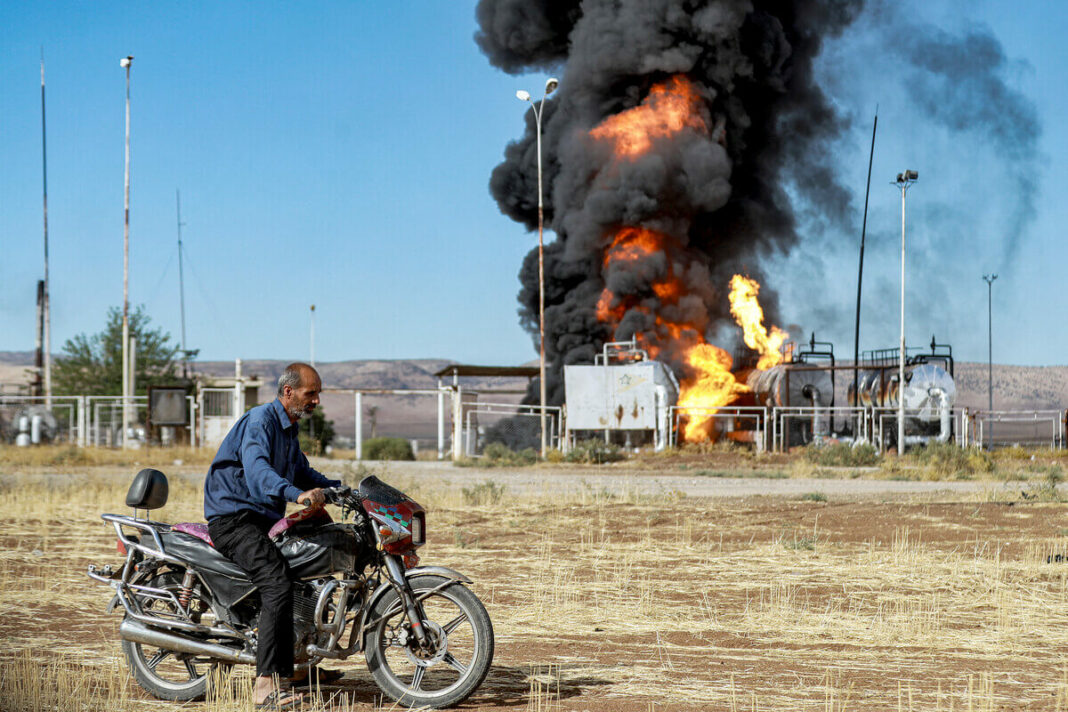Turkish airstrikes in drought-struck northeast Syria have cut off access to electricity and water for more than a million people, in what experts say may be a violation of international law, according to a report by the BBC World Service.
Turkey carried out more than 100 attacks between October 2019 and January 2024 on oil fields, gas facilities and power stations in the Kurdish-held Autonomous Administration of North and East Syria (AANES), according to data collated by the BBC.
The attacks have added to the humanitarian crisis in a region reeling from a years-long civil war and four years of extreme drought exacerbated by climate change.
Water had already been scarce, but attacks on electricity infrastructure in October last year shut off power to the region’s main water station, in Alouk, and it has not been working since. On two visits there, the BBC witnessed people struggling to get water.
Turkey said it had targeted the “sources of income and capabilities” of Kurdish separatist groups it regards as terrorists.
It said that it was well known there was a drought in the area, adding that poor water management and neglected infrastructure had made things worse.
The AANES has previously accused Turkey of seeking to “destroy our people’s existence.”
More than a million people in Hassakeh province who once got their water from Alouk now rely on deliveries of water pumped from around 12 miles (20km) away.
Hundreds of deliveries are made by tanker each day, with the water board prioritizing schools, orphanages, hospitals and those most in need.
But the deliveries are not enough for everyone.
In Hassakeh city, the BBC saw people waiting for the tankers, pleading for the drivers to give them water. “Water is more precious than gold here,” said Ahmad al-Ahmed, a tanker driver. “People need more water. All they want is for you to give them water.”
People living in the region have been caught up not only in Syria’s ongoing civil war but also in Turkey’s conflict with Kurdish-led forces, who established the AANES in 2018 after they — with support from the US-led coalition — drove the Islamic State in Iraq and the Levant (ISIL) group out of the region. Coalition forces are still stationed there to prevent a resurgence of ISIL.
Turkey’s president, Recep Tayyip Erdoğan, has described the AANES — which is not officially recognized by the international community — as a “terrorist state” next to its border.
The Turkish government considers the Kurdish militia that dominates the main military force there to be an extension of the outlawed Kurdistan Workers’ Party (PKK), which has fought for Kurdish autonomy in Turkey for decades.
The PKK is designated as a terrorist organization by Turkey, the EU, the UK and the US.
Between October 2023 and January 2024, electricity transfer stations in three areas of the AANES were struck: Amouda, Qamishli and Darbasiyah, as well as the region’s main power plant, Swadiyah.
The BBC confirmed the damage by using satellite imagery, eyewitness videos, news reports and visits to the sites.
In February 2024 a report published by an independent UN commission said the October 2023 attacks on electricity infrastructure could amount to war crimes because they deprived civilians of access to water.
The Turkish government said it “fully respects international law,” adding that the UN’s February 2024 report provided “no substantiating evidence” for its “unfounded allegations.”
It blamed water shortages in the region on climate change and “long-neglected water infrastructure” maintenance there.
Human Rights Watch (HRW) also released a statement in October 2023, warning of a deteriorating humanitarian crisis in the region after drone strikes by the Turkish military on Kurdish-held areas of northeast Syria damaged critical infrastructure and resulted in water and electricity disruptions for millions of people.
Turkey launched the bombing campaign in the region after the PKK claimed responsibility for a bombing near government buildings in Ankara that injured two police officers. Turkey claimed the attackers came from and were trained in Syria.


